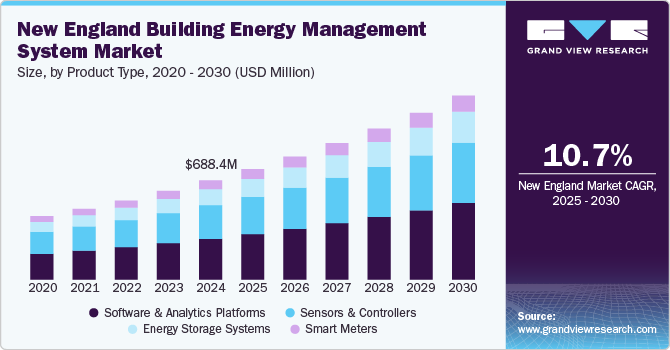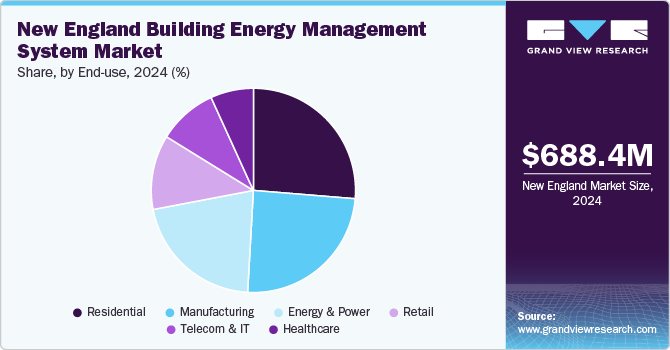- Home
- »
- Next Generation Technologies
- »
-
New England Building Energy Management System Market, Report, 2030GVR Report cover
![New England Building Energy Management System Market Size, Share & Trends Report]()
New England Building Energy Management System Market Size, Share & Trends Analysis Report By Product Type (Sensors & Controllers, Smart Meters), By End-use (Residential, Telecom & IT), And Segment Forecasts, 2025 - 2030
- Report ID: GVR-4-68040-484-5
- Number of Report Pages: 100
- Format: PDF, Horizon Databook
- Historical Range: 2017 - 2024
- Forecast Period: 2025 - 2030
- Industry: Technology
New England BEMS Market Size & Trends
The New England building energy management system market size was estimated at USD 688.4 million in 2024 and is expected to grow at a CAGR of 10.7% from 2025 to 2030. Factors driving the market growth include the stringent energy efficiency regulations, growing focus on sustainability and green building initiatives, and the convergence of technologies, such as IOT, AI, and big data analytics are primarily driving the growth of the market. Stringent energy efficiency regulations are a significant driver in the market. States in the New England region, such as Massachusetts, Vermont, and Connecticut, have implemented some of the most rigorous energy codes in the U.S. These regulations aim to reduce energy consumption, lower carbon emissions, and promote sustainability across residential, commercial, and industrial sectors.

Various companies across the region are integrating Environmental, Social, and Governance (ESG) goals into their operations, seeking to demonstrate a commitment to sustainability. BEMS plays a crucial role in helping organizations monitor and reduce energy use, cut greenhouse gas emissions, and improve their overall environmental footprint. In New England, the push for net-zero energy buildings and adherence to Passive House standards has also contributed to this trend. These initiatives require buildings to be exceptionally energy-efficient, often necessitating the use of intelligent energy management solutions to optimize performance. As awareness of climate change grows, the emphasis on green building practices is expected to continue driving the BEMS market, supporting broader sustainability and environmental goals across the region.
The convergence of technologies, such as IoT, AI, and big data analytics, offers substantial opportunities for BEMS providers. By developing systems that leverage IoT devices, companies can enable real-time monitoring and control of energy consumption across various building systems. Integrating AI algorithms can enhance predictive maintenance and optimize energy management based on occupancy patterns, weather conditions, and energy pricing. As smart building solutions gain traction, companies that offer integrated platforms combining BEMS with IoT and AI will likely capture a significant share of the market.
Product Type Insights
The software & analytics platforms segment led the market and accounted for over 41.0% share of the global revenue in 2024. New England is seeing a surge in the adoption of IoT-enabled BEMS, which facilitate real-time monitoring and control of energy consumption across various building systems. This integration allows for enhanced data analytics and operational efficiency. Moreover, significant initiatives by major players in this industry are also augmenting the market expansion. For instance, in January 2024, Honeywell unveiled a new control system aimed at optimizing energy consumption in buildings. This advanced solution features real-time monitoring and predictive analytics, enabling organizations to reduce costs and improve sustainability. With seamless integration capabilities, it supports facility managers in creating smarter, greener environments.
The energy storage systems segment is predicted to foresee the highest growth from 2025 to 2030. The growth is driven by significantly transforming building energy management systems and contributing to a more resilient and sustainable energy future. As utilities, businesses, and municipalities increasingly recognize the benefits of energy storage, innovative solutions are being deployed across the region to enhance grid reliability, support renewable energy integration, and achieve ambitious decarbonization goals. Additionally, as New England continues to expand its renewable energy capacity, energy storage systems are becoming a vital component of the energy landscape. By storing surplus energy produced from renewables such as solar and wind, these systems ensure a steady energy supply and contribute to lowering greenhouse gas emissions.
End-use Insights
The residential segment accounted for the largest market revenue share in 2024. The growth is driven by increasing awareness of energy efficiency among homeowners which has led to a heightened demand for systems that can monitor and optimize energy use. Additionally, many states in the region offer incentives and rebates for energy-efficient upgrades, encouraging investments in smart technology.
In addition, significant initiatives and investments in this region is augmenting the market growth. For instance, in June 2024, Massachusetts, along with other New England states, has been selected to receive $389 million in federal funding aimed at enhancing transmission and energy storage infrastructure. This significant investment will support the region's transition to a cleaner energy future, improve grid reliability, and foster economic growth. The funding is part of a broader initiative to modernize energy systems and promote sustainable energy practices across residential areas in the Northeast.

The telecom & IT segment is expected to showcase the highest growth from 2025 to 2030. The rise of Internet of Things (IoT) devices and cloud computing is transforming BEMS, making them more efficient and user-friendly. Telecom companies in New England are leveraging these technologies to enhance connectivity and data management, crucial for real-time energy monitoring and optimization. Moreover, the adoption of edge computing in this region is becoming prevalent, allowing telecom providers to process data closer to the source, thereby improving response times and reducing latency in energy management applications.
Key New England Building Energy Management System Company Insights
Some market key players are Control Technologies, Inc., Energy & Technical Services Ltd. (ETS), and Trane Technologies These companies are integrating BEMS solutions with its HVAC systems, providing customers with a seamless platform to manage heating, cooling, and overall energy use. This integrated approach simplifies energy management, making it more convenient for building owners to monitor and optimize performance.
-
Control Technologies, Inc. holds a strong regional presence and reputation. As a well-established company, it has built credibility across various sectors, including commercial and industrial applications. One of its key strengths is the ability to provide customized energy management solutions tailored to the specific needs of local clients, making it especially competitive in retrofit projects where older buildings require modern energy upgrades.
-
Energy & Technical Services Ltd. (ETS) positions itself as one of the prominent distributors of energy efficiency solutions. The company's success stems from its focus on helping clients reduce operational costs, which is a significant advantage in New England, where energy prices are among the highest in the U.S. ETS has developed expertise in designing and implementing systems that optimize energy use, making them a go-to choice for businesses looking to enhance efficiency.
Key New England Building Energy Management System Companies:
- ABB
- BuildingIQ
- Current Lighting Solutions, LLC
- Enel X North America, Inc.
- GridPoint
- Honeywell International Inc.
- Johnson Controls Inc.
- Schneider Electric
- Siemens
- Trane Technologies plc
Recent Developments
-
In August 2024, Honeywell International Inc. collaborated with Cisco, a digital communications technology company, to reduce building energy consumption. By integrating Cisco Spaces with Honeywell Forge Sustainability+ for Buildings, the collaboration envisaged using ML and AI to monitor assets and adjust HVAC systems based on the real-time occupancy data of buildings.
-
In July 2024, Schneider Electric signed an agreement with Planon, a provider of smart sustainable building management software, to increase its stake in the latter to 80%. The transaction aimed to enhance Schneider Electric’s software portfolio by leveraging Planon’s robust presence in the smart buildings market, its cloud-based integrated workplace management system, and its subscription-based software business model, which is well-suited to capitalize on the rapidly expanding smart building market.
-
In May 2024, Trane Technologies plc participated in the U.S. Department of Energy’s Commercial Building Heat Pump Technology Challenge, which challenges manufacturers to develop advanced, cost-effective heat pump rooftop units that meet an advanced technology specification developed by the department and help organizations meet their objectives related to energy efficiency and decarbonization.
New England Building Energy Management System Market Report Scope
Report Attribute
Details
Market size value in 2025
USD 767.6 million
Revenue forecast in 2030
USD 1.27 billion
Growth rate
CAGR of 10.7% from 2025 to 2030
Actual data
2017 - 2024
Forecast period
2025 - 2030
Quantitative units
Revenue in USD million/billion and CAGR from 2025 to 2030
Report coverage
Revenue forecast, company ranking, competitive landscape, growth factors, and trends
Segments covered
Product type, end use, region
Key companies profiled
ABB; BuildingIQ; Current Lighting Solutions, LLC; Enel X North America, Inc.; GridPoint; Honeywell International Inc.; Johnson Controls Inc.; Schneider Electric; Siemens; and Trane Technologies plc
Customization scope
Free report customization (equivalent up to 8 analysts working days) with purchase. Addition or alteration to country, regional & segment scope.
Pricing and purchase options
Avail customized purchase options to meet your exact research needs. Explore purchase options
New England Building Energy Management System Market Report Segmentation
This report forecasts revenue growth at global, regional, and country levels and provides an analysis of the latest industry trends in each of the sub-segments from 2017 to 2030. For this study, Grand View Research has segmented the global New England building energy management system market report based on product type and end-use.
-
Product Type Outlook (Revenue, USD Billion, 2017 - 2030)
-
Sensors & Controllers
-
Smart Meters
-
Energy Storage Systems
-
Software & Analytics Platforms
-
-
End-use Outlook (Revenue, USD Billion, 2017 - 2030)
-
Residential
-
Energy & Power
-
Telecom & IT
-
Manufacturing
-
Retail
-
Healthcare
-
Frequently Asked Questions About This Report
b. The New England building energy management system market size was estimated at USD 688.4 million in 2024 and is expected to reach USD 767.6 million in 2025.
b. The New England building energy management system market is expected to grow at a compound annual growth rate of 10.7% from 2025 to 2030 to reach USD 1.27 billion by 2030.
b. The software & analytics platforms segment dominated the New England building energy management system market with a share of 41.1% in 2024. New England is seeing a surge in the adoption of IoT-enabled BEMS, which facilitate real-time monitoring and control of energy consumption across various building systems. This integration allows for enhanced data analytics and operational efficiency.
b. Some key players operating in the New England Building Energy Management System (BEMS) market include ABB; BuildingIQ; Current Lighting Solutions, LLC; Enel X North America, Inc.; GridPoint; Honeywell International Inc.; Johnson Controls Inc.; Schneider Electric; Siemens; and Trane Technologies plc.
b. Stringent energy efficiency regulations are a significant driver in the New England BEMS market. States in the New England region, such as Massachusetts, Vermont, and Connecticut, have implemented some of the most rigorous energy codes in the U.S. These regulations aim to reduce energy consumption, lower carbon emissions, and promote sustainability across residential, commercial, and industrial sectors.
Share this report with your colleague or friend.
![gvr icn]()
NEED A CUSTOM REPORT?
We can customize every report - free of charge - including purchasing stand-alone sections or country-level reports, as well as offer affordable discounts for start-ups & universities. Contact us now
![Certified Icon]()
We are GDPR and CCPA compliant! Your transaction & personal information is safe and secure. For more details, please read our privacy policy.
We are committed towards customer satisfaction, and quality service.
"The quality of research they have done for us has been excellent."





